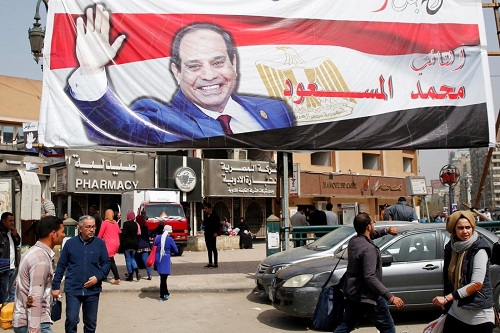Reuters photo
By
Ahmed Tharwat
Egypt between the ballot and grocery box
Egyptians don’t seem to do things fast or be in a hurry, and have mustered the art of doing nothing as a form of civil disobedience. However, last Saturday, millions of Egyptians were given three days to decide on a constitutional referendum amendment that would give Abdel Fattah el-Sisi more power and the possibility of staying in office until 2030. The current constitution limited the president to only two terms, four years each, el-Sisi already in his second term.
The referendum wasn’t debated, discussed in public, and nobody knows the exact details and ramifications. Egyptians have to take el-Sisi’s word for it, and mark Yes on the ballot. A national campaign took off, “Say yes for Egyptian security”, and “Say yes for Egypt’s future”, millions of signs covering Egypt, everywhere; streets, billboards, headlines, TV/Radio 24/7 announcements, talk shows, pundits, flying in the skys cars, buses, riverboats, even written on donkeys. The walls where revolutionary graffiti saw its heyday during the Arab Spring have now been washed off and replaced by pictures of el-Sisi mania and Say Yes campaigns. Government institutions, employees, police, army, judges, head of unions, head of Universities, were all on board cheering people to Just Say YES for the future and safety of Egypt.
Let el-Sisi continue his mega plans for Egypt, goes the argument. Egyptian dictators treat the constitution like a car that needs to be upgraded and changed every few years. The biggest challenge to election officials was that there weren’t enough people as excited as they were about the referendum. Egyptians are still skeptical, millions planning on staying at home. The election officials know you can’t fake an election if nobody shows up at the polling stations. As an Egyptian politician movie character once said to a community organizer, “the voters’ job is to show up, voting as they wish, it is their job, the election results is our job.”
To entice people to show up at the polling stations, the government launched a massive nationwide campaign of bribery and collusion with wealthy business elites, where money, phone cards, free rent, free medicines,and illegal drugs were seen distributed in the street. The head of Cairo University promised students an extra 5% grade to all students, “ You are the future of Egypt, what is a 5% extra for the sake of Egypt,” he lectured the crowd inside the university sanctuary campus.
Police cars that are strictly for arresting political oppositions were seen taking people to polling stations. Ambulances that don’t usually respond to emergency calls, were seen carrying voters, a man with no feet was seen being carried to a polling station; talk about voting with your missing-feet. Public transportation, trains, buses, and subways offered free rides to voters. People were paid to gather in front of the polling stations to dance for the cameras.
However, the most ridiculous vote bribe used to entice people to go to the ballot box was, (el-Kartonah) the Grocery Box. The military, who brought el-Sisi to power, were not going to let their man down so they sent the troops to the battlefield, military trucks seen in the streets handing out grocery boxes (el-Kartonah) to potential voters, a box full of rice, oil, sugar,etc. The lines at the grocery box distribution centers were much longer than the lines at the ballot boxes.
El-Sisi, who earned so many unflattering nicknames, since he came to power, names like Halawah, (sweet), Balahah (date) beggar, Awaad, the Pimp, has now earned another name that is floating on social media and activists started having fun with it: Abu-Kartonah, the father of Cartoon, referring to the grocery box bribes.
Egyptians have a religious inclination and temperament, so miracles were seen inside polling stations, a cripple started walking, a blind man got his sight back, “Now, I can see, I can see you now” he screamed at the election judge. Dead people’s names miraculously appeared on some ballots.
This referendum took three days, and that was the easy part, producing the results or turnout numbers are the hard part. The government officials denied any wrong doing, “everything went smooth as planned” stated an election official, and as usual accused the illegal Muslim Brotherhood organization of being behind the Kartonah bribe debacle, “to distort Egypt’s image in front of the world” he explained.
The referendum turnout was so low an election official threatened to prosecute anyone who made it public, which begs the question why a dictator who came to power on a tank, goes through all these troubles to have a constitutional referendum in the first place.
Ahmed Tharwat
Ahmed Tharwat is the Producer and Host of the Arab-American TV show BelAhdan. His articles are published in national and international publications. He blogs at Notes from America, www.ahmediatv.com and his articles appear in national and international publications. Follow him on Twitter @AhmediaTV.



No Comments Yet!
You can be first to comment this post!